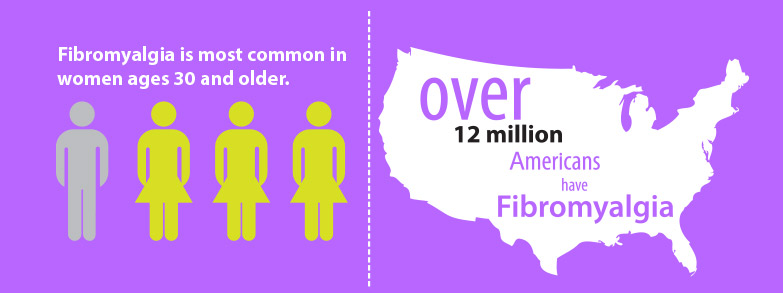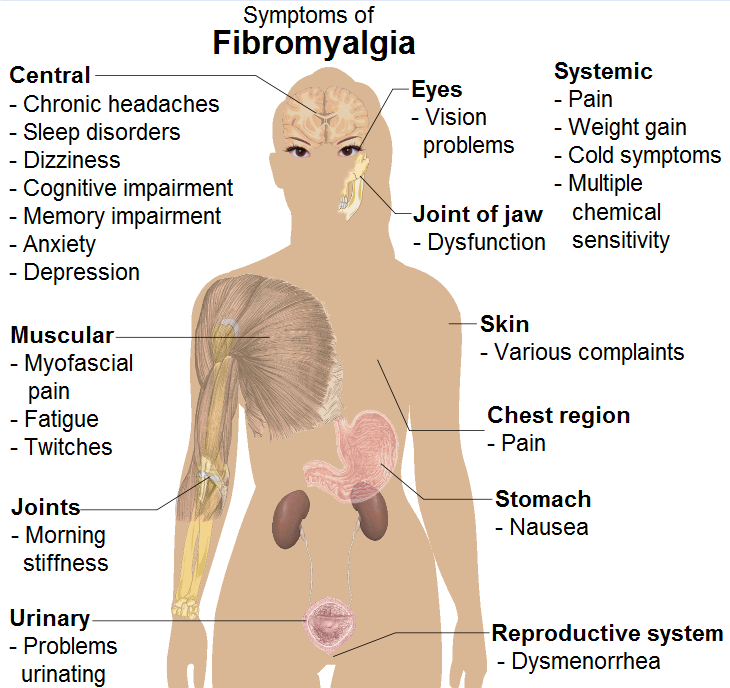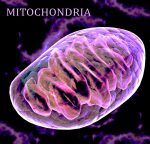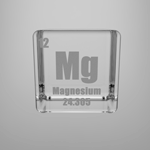Fibromyalgia appears to be one of those ‘modern’ diseases and women seem to be the biggest sufferers of this distressing condition. The symptoms of fibromyalgia in women, looks at why this problem seems to have come out of nowhere but now afflicts millions of people across the world.
 Statistics
Statistics
The National Fibromyalgia Association estimates as many as 12 million people in the USA have this syndrome and 90% of cases are diagnosed in women, according to U.S. government statistics. Those men that do come down with the condition usually often have different symptoms which are milder and fewer than those of women.
Fibromyalgia (FM) was not given official status until the 1990s. Until then, fibrositis was commonly diagnosed. CFS (chronic fatigue syndrome) is often associated with FM as it has symptoms in common. With CFS, a recurring sore throat, swollen glands and a mild fever are additional symptoms which helps distinguish the two conditions.
 So what’s happening?
So what’s happening?
It is considered by many doctors¹ that FM is to do with our modern lifestyle. Accumulated toxins and chemicals, a plethora of prescription drugs, diminishing nutrients from our soils, the diminishing quality of our food and the stresses of our everyday living. Our immune systems are under attack not only from the environment but also from the amount of chemicals and pharmaceutical drugs our bodies have to deal with constantly.
 Our toxic load…
Our toxic load…
As we go through our lives from birth onwards, we are subjected to events that could slowly deteriorate our health and deplete our nutrients. From cortisone creams for nappy rash to yearly flu injections which have mercury in them. From many doses of antibiotics for ear infections, coughs, colds and flu
 to more antibiotics and cortisones for treatment of acne and eczema. More antibiotics for bladder infections and antibiotics wrongly prescribed for yeast infections. From all the vaccinations from birth to adulthood which are known to contain toxins.
to more antibiotics and cortisones for treatment of acne and eczema. More antibiotics for bladder infections and antibiotics wrongly prescribed for yeast infections. From all the vaccinations from birth to adulthood which are known to contain toxins.
 Depleting our precious nutrients
Depleting our precious nutrients
By the time we have grown, we have been given an array of different drugs which will all deplete vital nutrients. Nutrients such as magnesium which will diminish with each drug that is administered. If it is not replaced, you will be sick and it could be the start of ill health, culminating in a shorter life wrought with cardiovascular problems, atherosclerosis, syndrome X, diabetes and other life threatening diseases. On the way to those diseases, problems such as FM and CFS will warn you of things to come as your body slowly succumbs to inadequate nutrition and a toxic burden.
in a shorter life wrought with cardiovascular problems, atherosclerosis, syndrome X, diabetes and other life threatening diseases. On the way to those diseases, problems such as FM and CFS will warn you of things to come as your body slowly succumbs to inadequate nutrition and a toxic burden.
The good news!
The good news is, your body is a wonderful biological machine that can heal itself if given the right nourishment by way of vitamins, minerals and all necessary nutrients. A healthy baby is born with all the necessary nutrients to keep him/her in good fettle. As long as  these nutrients are kept at optimum levels and are not depleted by unnatural and toxic chemicals, there is no reason why that baby shouldn’t grow up to be a strong, vibrant and healthy adult, who in turn will produce strong, vibrant and healthy offspring.
these nutrients are kept at optimum levels and are not depleted by unnatural and toxic chemicals, there is no reason why that baby shouldn’t grow up to be a strong, vibrant and healthy adult, who in turn will produce strong, vibrant and healthy offspring.
We’ve lost our way
Unfortunately, we seem to have lost our way when it comes to good health. We are now controlled by pharmaceutical drugs and junk food. Instead of looking for the root cause of any illnesses that occur as we go through our lives, we look to drugs to control our problems instead of curing them with good quality nutrients that we all need.

Symptoms of fibromyalgia & symptoms of Mg deficiency (in blue)
- Chronic Headaches – Migraines
- Sleep disorders/insomnia – Insomnia
- Dizziness – Vertigo
- Cognitive impairment – decreased brain plasticity
- Memory impairment – short term memory loss
- Anxiety – Anxiety and panic attacks
- Depression – Depression
- Muscle pain – Muscle pain and spasms
- Muscle fatigue – Lactic acid buildup
- Muscle twitches – Muscle twitches and tics
- Stiffness of joints – Calcium in joints ie. arthritis
- Urinary problems – Frequent urination
- Vision problems – Blurred vision and eye damage
- Jaw joint dysfunction – Temporomandibular joint (TMJ) dysfunction
- Systemic pain – muscle, joint, chest pain/headaches
- Weight gain – weight gain/diabetes
- Cold symptoms – allergies
- Chemical sensitivity – allergies and asthma
- Various skin complaints – Itchy skin and rashes
- Chest pain – Chest pain/Mitral valve dysfunction
- Nausea – Nausea with migraines
- Dysmenorrhea – Painful periods
 Most common Mg deficiency symptoms
Most common Mg deficiency symptoms
As you can see, the symptoms of Mg deficiency and FM are almost identical. A Mg deficiency will display itself in many ways and each person will have slightly different symptoms of varying severities. The most common complaints are:
- Insomnia or sleeping problems
- Muscle cramps, restless leg syndrome and twitches, particularly around the eyes
- Depression, anxiety and mood swings
- Migraines and headaches
- Brain fog and forgetfulness
- Heart arrhythmias
- Digestive problems, constipation or IBS type symptoms
- In older people, difficulty swallowing is often a problem
If you look at these symptoms, they mostly all relate to tension, tightness and anxiety. Without enough Mg, it is difficult for a body to relax and many symptoms reflect this tension.
So let’s go through a few of the most debilitating symptoms.
Insomnia
Insomnia is very common and it’s quite devastating if you have to put up with it night in, night out. How can you function without a good night’s sleep, it’s almost impossible. This leads to a vicious circle of fatigue and depression. Without adequate Mg levels, you won’t sleep well.
 Muscle problems
Muscle problems
Calcium (Ca) builds up by default and too much Ca will cause tightness in your body and mind. Ca is the mineral of tension. Ca overload will cause inflammation in the body and will invoke muscle twitches and muscle spasms. Mg, on the other hand, is an anti-inflammatory. Calcium causes muscles to tense, Mg causes muscles to relax.
Mg equals relaxation
Mg is the relaxation mineral and will help with anything tight or tense. You need these two vital minerals in equal measures to be healthy. If you have insomnia, you won’t have it for long if you take a good quality Mg supplement. Don’t consume Ca products in the evening and that includes milk! Don’t consume antacids such as ‘Tums’ (CaCO3 which is chalk) they will up your Ca levels which cannot easily be matched with Mg. Anyway, if you take a Mg supplement your digestive problems will abate and you won’t need antacids. You need to have enough Mg to control Ca in the blood and stop it from calcifying and settling in your soft tissue. If you do have calcification problems then vitamin K2 (menaquinone 7) will help Mg to move excess Ca into the bones where it belongs.
Weight gain

Exercise is often suggested to help symptoms of fatigue for FM and CFS sufferers. But if you have these conditions, exercise is absolutely exhausting. Your Mg levels have been depleted to such an extent that you are running on empty. Lactic acid builds up which leads to more pain because it cannot be cleared by the enzyme that needs Mg to function. All the symptoms, plus a lack of exercise can lead to weight gain and type 2 diabetes. Diabetes researcher Dr Jerry Nadler says “diabetes is a magnesium deficiency state”.
Chest pain
Many sufferers complain of chest pain. This, of course, puts the frighteners on and just exacerbates your feelings of depression and helplessness. The chest pain is probably symptomatic of a Mg deficiency and could be to do with the mitral valve and the muscles around it that can cramp up just like any other muscles of the body. If you get cramp in the calf, you know exactly what it is. If you get cramp in the stomach area, it is likely to be put down to IBS, if you get cramps during your period, it will be considered to be dysmenorrhea. If you get chest pain, well that’s a different matter, everyone gets concerned. But it is likely to be cramp of the muscles in your chest area. But we aware, the heart muscle can cramp too. The left ventrical of the heart needs massive amount of Mg to function properly. Although the body does its best to keep enough Mg available for the heart, if Mg is very low, you could get such symptoms as heart arrhythmias and chest pain.
concerned. But it is likely to be cramp of the muscles in your chest area. But we aware, the heart muscle can cramp too. The left ventrical of the heart needs massive amount of Mg to function properly. Although the body does its best to keep enough Mg available for the heart, if Mg is very low, you could get such symptoms as heart arrhythmias and chest pain.
Mitochondrial dysfunction
All problems of health that we have, stem from our cells. Many modern doctors and researchers are concluding that mitochondrial dysfunction is the hub of our ailments. If our mitochondria are healthy and running at optimum levels, we will be fit and well.
 What are mitochondria?
What are mitochondria?
These are the power houses within our cells and they produce energy for the whole of our body. Mg is necessary for up to 800 enzymatic reactions in our bodies and a deficiency can affect all areas of our health. The most important enzyme reaction is the creation of energy by activating adenosine triphosphate (ATP) within the mitochondria, officially known as Mg-ATP.
A good start
If you are unwell in any area of your body, you will greatly benefit from replenishing your Mg levels because those who are unwell will be deficient in Mg. An estimated 80% of the population of the US are Mg deficient.
Don’t be complacent
If you’re lucky enough not to be ailing at all and you’re in the best of health, keep it that way by not letting your Mg levels deplete as they tend to do as we age. Take a good quality Mg supplement such as Mg Chloride ie. ReMag, Ionic Mg, Mega Mag or if you suffer from a sluggish digestive system use a Mg Citrate powder. Set yourself up for a happy, healthy and long life, your health should be in your hands and under your control.
 Don’t forget the kids!
Don’t forget the kids!
With all the junk food and diet sodas that many of our kids love to consume, constipation in children is very common as is ADHD, ADD, asthma, seizures etc.. These kids will often have low Mg levels. Mg Citrate is great for kids who sometimes have a sluggish digestion as well as other disorders. It is tasteless and can be sprinkled over their favourite foods and they won’t even know they’ve had it. Being a powder, the doses of Mg Citrate are so easy to control. Start with a little amount and increase slowly until you find the right dose for your child. Don’t forget Mg is a natural mineral that we all need and that includes children. If too much is given at once, the only side effect will be loose stools. Little and often is the way to dose.
 The silver bullit?
The silver bullit?
Now I’m not saying that Mg is the be all and end all of everything but what I am saying is if you haven’t got enough of it, you WILL be unwell. What’s more, a lack of Mg will make you lack lustre and unable to get yourself out of your malaise whatever it is. But whatever it is, it will need plenty of Mg because this nutrient is necessary for every one of your 37.2 trillion cells and it is vital for energy production within those cells.
Reclaim your energy, drive and sanity
You will then have the energy, drive and calmness of mind to continue your road to recovery. You can then finesse your other nutrient needs by researching your conditions and discovering the vitamins and minerals you may be lacking. Good luck to all you FM and CFS sufferers. I hope this article will help you take control.
PS. Try and find a naturopathic and allopathic medical practioner rather than just an allopathic doctor. Naturopathic doctors are often trained firstly as an MD, then diversify into naturopathic medicine using natural nutrients and only prescribing drugs as a last resort.
 Goldberg B, Chronic Fatigue, Fibromyalgia & Environmental Illness: 26 Doctors Show You How They Reverse These Conditions with Clinically Oriven Alternative Therapies, Future Medicine Publishing, Tiburon, CA, 1998.
Goldberg B, Chronic Fatigue, Fibromyalgia & Environmental Illness: 26 Doctors Show You How They Reverse These Conditions with Clinically Oriven Alternative Therapies, Future Medicine Publishing, Tiburon, CA, 1998.
Spread the word!


Hello Ches,
I have been taking Magnesium Bicarbonate water for maybe a year now and have had some positive results. The very first benefit being my prostate problems are considerably lessened which is very welcome.
Also some of the symptoms of Fibromyalgia have subsided a little but I still have the chronic fatigue and many other symptoms.
I know this is a condition which seems to affect women more than men but this is something I would not wish on anyone, it is truly debilitating.
Would you recommend I continue with this mix of Magnesium I am taking, or would I benefit more from taking the Magnesium Chloride which you say is the most beneficial?
Here’s the website where I attained the recipe:
https://www.watercures.org/magnesium-bicarbonate-water-recipe.html
Thanks for all the effort you have put into creating this site, it’s remarkable.
Phil
Hi there Phillip and thanks very much for your comments. As for your question, although Mg Bicarbonate is one way of providing some Mg for your body, it is not the most efficient way and is not as bioavailable as Mg Chloride. Therefore, I would recommend you change to Mg Chloride. I have a link showing you how to do your own. As you probably know, food quality Mg Chloride, such as ReMag, is expensive to buy. ReMag is a very high quality product but inhibitive to many because of the price. Here in the UK it is even more expensive.
Yes, fibromyalgia does seem to affect women more than men and often the symptoms are somewhat different. Even so, the fact you have the condition means you are Mg deficient. Start slow with one dose and always take throughout the day rather than all at once. Up the doses until you find your symptoms have gone. I put mine in a jug of water (4 doses which equals 600mg) and take a gulp every now and then. This avoids the laxative effect, although many with Mg deficiency often have the opposite problem ie. constipation.
Other problems you may encounter are pulpitations (heart arrhythmia), irritating twitches around the eyes and face, cramps, back spasms caused by muscle cramps, chest pains often caused by cramping of the mitral and other heart valves, insomnia, trouble swallowing, headaches etc.. Remember, magnesium is the relaxation mineral, calcium, it’s antagonistic partner, is the mineral of tightness and tension. These two minerals need to be in equilibrium for them both to work at their most efficient. As Ca is abundant in our modern diet, (our foods are often fortified with Ca), we tend to ingest more of it than we ever do Mg, hence the plethora of problems we encounter because of this deficiency.
If you regularly take Mg then you will be doing yourself a favour in more ways than one. Firstly, your energy will rise and your mood will be lifted. The most important, in my opinion, is reducing calcification within the body. Calcification can happen anywhere, in the arteries, including the heart, in the jugular veins, in our joints. If Calcium is not controlled, deposits of this minerals will settle in different places within the body. Mg controls Ca and stops it settling in our cells. Mg is the ‘gatekeeper’ to our cells, only letting Ca in when it is necessary and then ushering it out when Ca has done its job. (See the little video at the top right of my site).
If Mg is scant in the body, this process will be impaired with obvious consequences. Worse, if Mg is really deficient, it can stop the heart from working and cause a heart event. Imagine your heart, which is a muscle, contracting and not being able to relax. This is a problem encountered by many athletes who deplete their Mg rapidly especially when taxing the body to excess during training or competing. The consequences can be deadly. Always take your Mg if you are stressing your body and that means any type of stress including mental as well as physical.
I’m sorry this reply is rather long winded but you are on the right track, I just want to make sure you stay there!! Please get back to me with any questions. I am sure your health will improve once you supplement with Mg Chloride.
Hello!
I found it interesting that so many symptoms can be related to fibromyalgia and magnesium deficiency.
I also noticed that you talk about a magnesium supplement a lot. However there’s nothing about getting magnesium naturally through diet.
Did you know that a cup of cooked spinach has 157 mg of magnesium which is 39% of the daily recommendation. Squash and pumpkin seeds are another that is high in magnesium. Pineapple, apples, bananas, and avocados are other suggestions as well.
Thanks!
Michelle
Hi Michelle and thanks for taking the trouble to read my post. I do talk of Mg supplements a lot but there is a reason for that. Unfortunately it is almost impossible to gain the amount of Mg that a body needs by just food alone. In the early 20th century, it was estimated that most people consumed around 500mg per day of Mg and that’s because our foods then were of good quality coming from good quality soils. Today our soils are depleted of vitamins and minerals and Mg is one of those most depleted and this is because of farming practices and the use of herbicides, pesticides and the like. We have a saying ‘you can’t make a silk purse out of a sow’s ear’. If the soil is depleted in Mg, the food grown in that soil will also be depleted in this vital mineral. I do have an article on site about Foods With High Magnesium. It is available on the side bar.
Those foods your mention should have an abundance of Mg within them but if you took the trouble to actually test them for Mg content you would be very surprised and very disappointed. The recommended daily allowances for Mg is set much too low according to researchers and the amount of spinach in that cup will depend on how and where it was grown.
I found your post very interesting, and a good source of information on this topic. I am currently not suffering from FM or CFS, and I’d like to keep it that way. What is the best source of magnesium if not ingested through supplementary vitamins?
It’s a frightening statistic that 90% of the 12 million cases of FM are in women.
Hi Kendra and I’m pleased you found the post interesting. As for your question of the best sources of Mg please see Foods With High Magnesium. Make sure your calcium consumption does not greatly exceed your Mg. The ideal ratio is 1:1 for these two important minerals but this is often quite difficult to achieve, especially as many of the food manufacturers add calcium to their food and drink. Another problem is the excess supplementation of calcium which women, in particular, are advised to take. Calcium based antacids are another problem. This can be positively harmful, especially when Mg levels are low, as they are in the majority of the population.